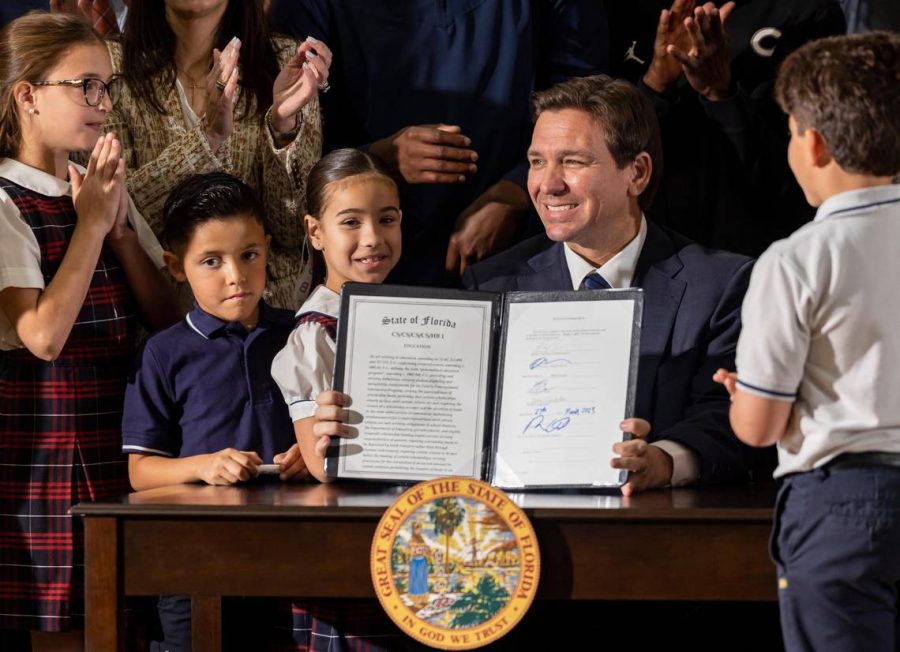Tribune News Service
Florida Governor Ron DeSantis reacts after signing a bill to expand private school vouchers across Florida during a press conference at Christopher Columbus High School on Monday, March 27, 2023, in Miami, Fla. Photo permission from Matias J. Ocner/TNS.
Florida to provide vouchers to pay for tuition and school choice
The state of Florida is expanding its school vouchers program to allow all K-12 students in Florida to receive an estimated $8,500 in taxpayer-funded vouchers for a student to attend the public, private or home school of their choice. The controversial bill, Senate Bill 202, was signed into law by Gov. Ron DeSantis on March 27 and will take effect on July 1 for the 2023-2024 school year.
This law does this by revising the current eligibility requirements for the Family Empowerment Scholarship Program and Florida Tax Credit Scholarship Program.
“There will be a preference for low and middle-income families but at the end of the day we fundamentally believe that the money should follow the student and it should be directed based on what the parent thinks is the most appropriate education program for their child,” DeSantis said at the bill’s signing ceremony at private, Catholic Christopher Columbus High School in Miami.
DeSantis’ remarks concerning the bill were met with much controversy from students at Marjory Stoneman Douglas High School, as affluent individuals may receive vouchers for their education that could have otherwise gone to aiding underprivileged students attend better schools.
“I don’t think the state’s new bill should have been passed,” freshman Lydia Varghese said. “The lack of clarity regarding who is receiving the money may further complicate issues regarding school tuition and scholarships, and end up not benefiting Florida students in any way.”
As it provides more options for families as to what schools parents want their child to attend, this bill will further incite discussions regarding the School Choice Movement, which supports parents’ right to send their children to schools that they are not assigned to. In addition to offering alternative educational opportunities, SB 202 will likely also escalate the academic competition and pressure among students and families.
In an article by The 74 Million, Emory University economics professor Krzysztof Karbownik said he anticipated that families and schools could “leverage the power of competition” to provide students a wider variety of options of attending school. With this addition of vouchers for private schools, students have the ability to enroll in prestigious schools, and would therefore benefit in previously competitive subjects.
The voucher program is estimated to cost $4 billion in taxes during its initial year. Many find issues with the fact that this taxpayer money would have gone to funding public schools. Disputes emerged regarding which schools would most likely receive the greatest influx of funding to support their students’ education.
“[This bill] defunds our public schools and diverts billions of public taxpayer dollars to mostly private Christian religious schools that lack standards of accountability, and have a history of discriminating against LGBTQ+ students, students of minority religions and students with disabilities,” an article written by the American Civil Liberties Union said.
MSD students also share a similar opinion, questioning the state government’s decision.
“I personally think that schools should be free of charge for all people, regardless of whether it is public or private,” junior Julia Levine said. “It’s not fair if biased schools are receiving money when other schools that are unbiased also need funding.”
This potential shift towards the formation of openly discriminatory schools leads to questions regarding DeSantis’ motives and agendas for the future of Florida’s school system. In 2021, HB 529 was passed, implementing a mandatory minute of silence in all public schools across the state. While many schools, including MSD, use this minute as a moment of reflection, the intentions behind the approval of this law may reflect what critics call “pro-religious policies” implemented by DeSantis during his time in office.
While this bill has not yet taken effect, its concerns from students, parents and school faculty across Florida are already abundant. The alterations this bill will create for the future of school choice and school vouchers may produce numerous impacts for students today and for the time ahead.
